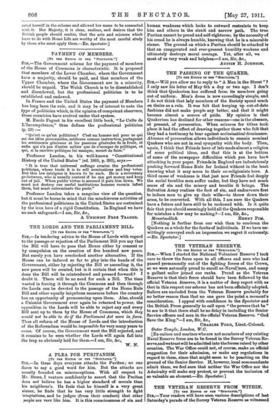PAYMENT OF MEMBERS.
[To THE EDITOR OF THE " STECTATOR."]
SIR,—The Government scheme for the payment of members of the House of Commons is characteristic. It is proposed that members of the Lower Chamber, where the Government have a majority, should be paid, and that members of the Upper Chamber, where the Government are in a minority, should be unpaid. The Welsh Church is to be disestablished and disendowed, but the professional politician is to be established and endowed.
In France and the United States the payment of Members has long been the rule, and it may be of interest to note the type of politician which, in the opinion of competent observers, those countries have evolved under that system.
M. Emile Faguet in his excellent little book, "Le Crate de L'Incompetence," thus defines the professional politician (p. 29) :—
" Qu'est ce qu'un politicien ? C'est un homme nul pour ce qui est des idees personnelles, mediocre comme instruction, partageant les sentiments generaux et les passions generales de la foule, et enfin qui n'a pas d'autre metier que de s'occuper de politique, et qui, si In carriere politique lui manque, meurt de faim."
Professor Landon, in his well-known "Constitutional History of the United States" (ed. 1905, p. 391), says :—
" It is true that universal suffrage creates the professional politician, whose trade it is to sell nominations and buy votes. But this low intriguer is known to be such. He is a mercenary go-between, who is usually content if he can get money and keep out of jail. When public virtue is aroused it puts him down. We must not destroy our useful institutions because vermin infest them, but must exterminate the pests."
Professor Landon takes a sanguine view of the question, but it must be borne in mind that the mischievous activities of the professional politicians in the United States are restrained by the iron bars of a rigid Constitution. In England we have no such safeguard.—I am, Sir, &c., A UNIONIST FREE TRADER.










































 Previous page
Previous page